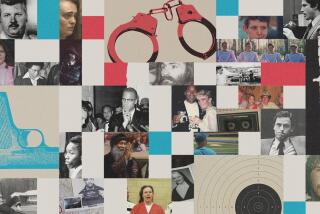What can go wrong -- and right
- Share via
* A mother knows something is terribly wrong with her toddler, but her fears and pleas are ignored. Her child slips away, dying of dehydration at one of the best hospitals in the country.
* An 89-year-old hospitalized woman spends 24 hours in agony because an order was incorrectly transcribed in her record. Instead of being treated with Percocet for ongoing pain, she spends a day untreated for it, agitated from cold turkey withdrawal.
* An infection, picked up in a catheter line, forces a couple to permanently shelve their retirement plans. The husband spends his days in a medical bed in his dining room, cared for by his wife, who vows they will never enter a hospital again.
Such are the healthcare problems highlighted in a four-part PBS special, “Remaking American Medicine ... Healthcare for the 21st Century,” which also looks at how to fix them. Change, it argues forcefully, will mean challenging and fighting America’s patchwork healthcare delivery system -- one that in some ways is the best in the world but in others is a flat-out calamity.
The series shines a light on all-too-common scenarios through compelling stories of people who have been devastated by the system and have fought back to badger it toward sensible change.
Watch all four episodes and you’ll come away with a terrifying sense of what can go wrong in medicine but also a glimmer of hope that maybe someday soon American patients won’t have to take it any more. The series, premiering Thursday at 10 p.m. and airing the following three weeks on PBS stations, including KCET, looks for answers and finds them in select hospitals and communities.
Anyone who has ever been sick knows that when fate escorts people through the doors of America’s healthcare delivery system, their lives slip from their own hands. “Nowhere else in our lives do we give up so much control as when we enter the healthcare system,” says John Hockenberry, host of the series.
The problems are huge. Medical errors cost an estimated 100,000 lives a year. Hospital-acquired infections have become resistant to the rescue of antibiotics. People with chronic diseases such as diabetes don’t receive, or comply with, lifesaving care. Patients and family members, presumably knowledgeable about their own or loved ones’ bodies, are ignored.
The series, in a segment called “Silent Killer,” leads with the tragic death of Josie King, an 18-month-old girl who wandered away from her parents, climbed in the bathtub, turned on the hot water and suffered severe burns. During her recovery at Baltimore’s Johns Hopkins Children’s Center, as she screamed for water and visibly lost weight overnight, her parents’ concerns and pleas were ignored. Josie’s father, Tony King, says that he and his wife were treated “like you’re just some parent, you don’t know what you’re doing.”
When the medical staff finally paid attention, their belated rescue efforts couldn’t save her. On Feb. 22, 2001, the toddler died of brain damage following severe dehydration.
The tragedy might have ended with a lawsuit or in a quiet settlement. But the Kings, insulted by the idea that a dollar amount could balance the loss of their child, took the settlement money they received and started a foundation to make patient safety a top concern, working with the staff at Johns Hopkins as a first step.
Other segments of the series focus on the effect of hospital-acquired infections, and attempts by hospitals in Pittsburgh and New Jersey to reduce the spread of germs through things as simple as nasal swabs and rigid hygiene. Some 2 million people a year pick up infections from the hands of healthcare providers.
Another segment looks at the work of Dr. Anne Peters, a Beverly Hills diabetes specialist who, in addition to helping her paying clients, is working with the Los Angeles County Department of Health Services to teach nurses in poor communities to provide high-quality care to people who cannot pay. In an experiment that could stem an epidemic of diabetes that threatens to overrun the county’s healthcare system, people going to public clinics in East Los Angeles are now getting the same quality care as Peters’ wealthy patients.
Because the clinic nurses speak the patients’ language and know the community’s culture, trust just might grow enough that people with diabetes will do the hard work of diet, exercise and monitoring their disease. Patients, Peters says, “see me for 20 minutes every three months. If they don’t take control, they’re not going to get better.”
The frightening truth is that all too often the healthcare system fails us, harms us -- even kills us. This series shows us some of the thousands of people who are not giving up on it, who are spending their lives trying to make it better and safer. They may be starting with one idea in one community, but it’s clear that many of them are not going to stop there. They want everyone who goes to a hospital, clinic or doctor’s office to be safe from medical harm, and proven preventive and treatment measures to be available to all. They want to be heard -- and it behooves all of us to listen.
*
‘Remaking American Medicine’ ‘Remaking American Medicine’
Where: KCET
When: 10 p.m. Thursday
Rating: TV-PG (may be unsuitable for young children)
More to Read
The complete guide to home viewing
Get Screen Gab for everything about the TV shows and streaming movies everyone’s talking about.
You may occasionally receive promotional content from the Los Angeles Times.






